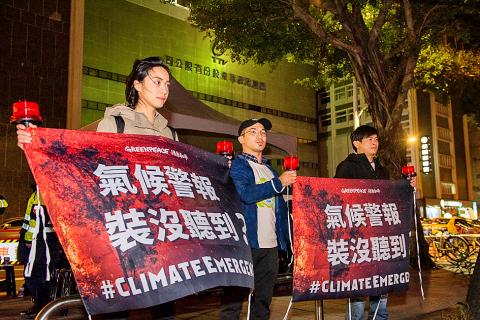Greenpeace Taiwan yesterday asked President Tsai Ing-wen (蔡英文) to quickly devise long-term solutions to energy issues and climate change.
The group said that 1,298 government agencies and organizations worldwide have declared a climate emergency to combat climate change consequences, but Taiwan still lacks adequate action plans.
During the presidential campaign period, climate policies proposed by the three candidates, including Tsai, were rated by Greenpeace Taiwan, which concluded that they all performed “below average.”

Photo courtesy of Greenpeace Taiwan
The Tsai administration has failed to present proactive carbon-cutting goals and long-term plans for energy transformation, it said, adding that the results of carbon reduction in the past four years were disappointing, while a lack of improvement would make it difficult to keep the climate crisis at bay.
Without stricter measures to reduce carbon, Taiwan would only slow other countries down in the global efforts to mitigate climate change, Greenpeace Taiwan energy project campaign specialist Alynne Tsai (蔡篤慰) said.
While Tsai Ing-wen has unveiled long-term plans for the development of offshore wind power, other areas of green energy development still lack vision, making development goals after 2025 for other renewable energy sources an urgent need, Alynne Tsai said.
Now that Tsai Ing-wen has won a second term, she should follow the UN’s Intergovernmental Panel on Climate Change guidelines to keep rising temperatures within 1.5°C of pre-industrial levels to prevent a climate catastrophe, Greenpeace Taiwan said.
A complete timeline to phase out coal power is needed, too, it said.
Greenpeace Taiwan said that the government’s four most urgent climate change policies are, in descending order: carbon-cutting goals, long-term plans for the development of renewables, renewables obligations for major power consumers and a timeline to phase out coal power.

The brilliant blue waters, thick foliage and bucolic atmosphere on this seemingly idyllic archipelago deep in the Pacific Ocean belie the key role it now plays in a titanic geopolitical struggle. Palau is again on the front line as China, and the US and its allies prepare their forces in an intensifying contest for control over the Asia-Pacific region. The democratic nation of just 17,000 people hosts US-controlled airstrips and soon-to-be-completed radar installations that the US military describes as “critical” to monitoring vast swathes of water and airspace. It is also a key piece of the second island chain, a string of

A magnitude 5.9 earthquake that struck about 33km off the coast of Hualien City was the "main shock" in a series of quakes in the area, with aftershocks expected over the next three days, the Central Weather Administration (CWA) said yesterday. Prior to the magnitude 5.9 quake shaking most of Taiwan at 6:53pm yesterday, six other earthquakes stronger than a magnitude of 4, starting with a magnitude 5.5 quake at 6:09pm, occurred in the area. CWA Seismological Center Director Wu Chien-fu (吳健富) confirmed that the quakes were all part of the same series and that the magnitude 5.5 temblor was

Taiwan will now have four additional national holidays after the Legislative Yuan passed an amendment today, which also made Labor Day a national holiday for all sectors. The Chinese Nationalist Party (KMT) and Taiwan People’s Party (TPP) used their majority in the Legislative Yuan to pass the amendment to the Act on Implementing Memorial Days and State Holidays (紀念日及節日實施辦法), which the parties jointly proposed, in its third and final reading today. The legislature passed the bill to amend the act, which is currently enforced administratively, raising it to the legal level. The new legislation recognizes Confucius’ birthday on Sept. 28, the

The Central Weather Administration has issued a heat alert for southeastern Taiwan, warning of temperatures as high as 36°C today, while alerting some coastal areas of strong winds later in the day. Kaohsiung’s Neimen District (內門) and Pingtung County’s Neipu Township (內埔) are under an orange heat alert, which warns of temperatures as high as 36°C for three consecutive days, the CWA said, citing southwest winds. The heat would also extend to Tainan’s Nansi (楠西) and Yujing (玉井) districts, as well as Pingtung’s Gaoshu (高樹), Yanpu (鹽埔) and Majia (瑪家) townships, it said, forecasting highs of up to 36°C in those areas